Investigating the start of animal husbandry in the Netherlands by means of radiocarbon dating and Bayesian modelling l Merita Dreshaj

Field/Dicipline
-
Archaeology
-
Materials Science
-
Biomaterials
Expertise
-
C14
-
radiocarbon dating
-
stable isotopes in Archaeology
-
material science applied to Archaeology
-
spectroscopy (Raman, XRD, SEM), IRMS, AMS
Summary
Chronological analysis of the development of animal husbandry in the Dutch wetlands has engendered much debate. The onset and duration of this complex process is still unclear, despite the amount of data available. Calibrated radiocarbon (14C) dates over this period lack precision due to the occurrence of a so-called calibration plateau which results in the adverse overlap of different phases, triggering ambiguity in the chronological narrative. To address this issue, this project aims to re-assess the excavation data from selected sites in order to establish a high-resolution Bayesian chronological model of both published and newly acquired 14C dates. The new 14C measurements are carried out at the Centre for Isotope Research (CIO) which houses one of the most sensitive and accurate accelerator mass spectrometers (AMS) currently available. Rigorous stratigraphic and contextual analysis in combination with the new chronometric data will help to overcome the calibration plateau and greatly increase the precision of individual events and processes. Read more about the umbrella project
Supervision by
-
M.W. (Michael) Dee, Prof Dr (Centre for Isotope Research, ESRIG, University of Groningen.
More information and contact details can be found on the personal profile of M. (Merita) Dreshaj
| Last modified: | 04 April 2023 8.27 p.m. |
